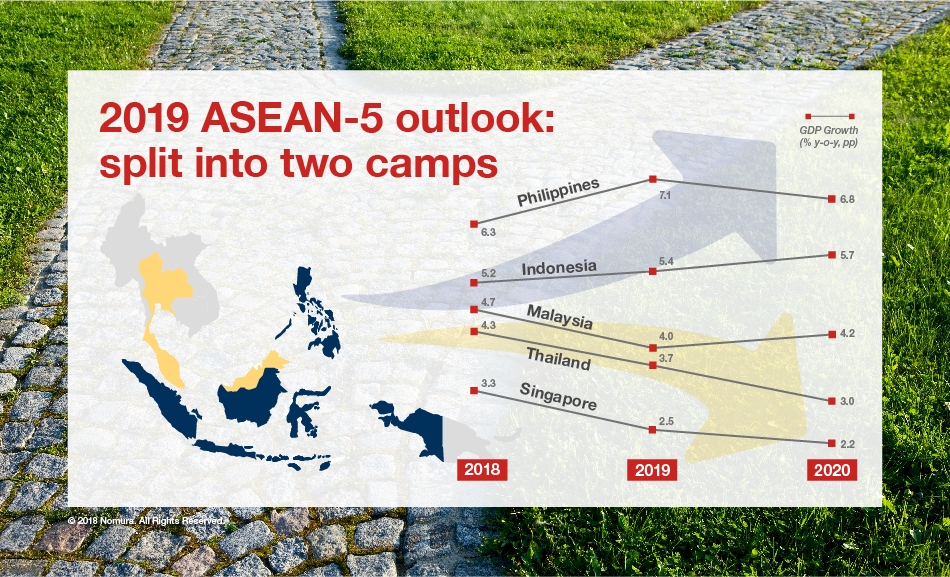Economics | 3 min video December 2018

Economics | 2 min video | December 2018

Economics | 2 min video | December 2018
Divided growth outlook in 2019
As the ASEAN-5 emerge from a difficult 2018, we see a divided growth outlook in 2019. Indonesia and the Philippines, in our view, will be bucking the global trend with accelerated GDP growth, while Malaysia, Singapore, and Thailand, will all be slowing due to weaker exports and structural constraints.
A key wedge driving the divergence of these two camps is slower external demand and the downcycle in the tech sector which we expect to deepen in H1 2019, hurting the second group of countries more. Structural issues such as deteriorating demographics and high household debt will also leave Singapore and Thailand even more susceptible to a slowdown. In Malaysia, we expect the spillover effects from a weak export sector to be relatively high at a time without policy buffers and commodity prices are falling, posing a potential negative terms-of-trade shock.
In contrast, we expect domestic demand in Indonesia and the Philippines to strengthen, receiving a near-term boost from election-related spending along with an expansionary fiscal stance. For both countries, we also see a continued uptrend in investment spending that is bolstering productivity growth.

ASEAN central banks seem diverged on monetary policies too
In terms of monetary policy outlook, central banks look split too. We believe Bank Indonesia (BI) and Bangko Sentral ng Pilippinas’ (BSP) hiking cycles are over and will leave rates unchanged through 2019 as inflation in the two countries have either peaked or are still on target. Further out, we expect a more favorable external backdrop and still on-target inflation that will allow BI to unwind some of 2018’s rate hikes, cutting rates by 100bp in 2020. Meanwhile, due to increasing concerns of growth and signs of easing financial-imbalances risk, we forecast Bank Negara Malaysia (BNM) to cut much earlier, delivering a 25bp policy rate cut in Q2 2019.
On the other hand, both Bank of Thailand (BOT) and the Monetary Authority of Singapore (MAS) are still pushing for policy normalization. Further tightening is expected at the next MAS meeting in April albeit a close call, while we expect the BOT to pause after a one-off 25bp hike in December.
Indonesia: Emerging stronger
The economy will likely emerge stronger from a volatile 2018, backed by pro-active and coordinated policy responses in the face of elevated external risks. We also expect President Jokowi to win a second five-year term with a stronger mandate which we believe bodes well for policy continuity and gradual growth recovery. In our view, the widening of the current account deficit is coming to an end and so is BI’s monetary policy tightening cycle.
Malaysia: Two headwinds
On top of our already cautious view, negative terms-of-trade shock and a deepening tech sector downcycle further present more headwinds. The weakening external demand, a high risk of fiscal slippage, and the possibility of a sovereign ratings downgrade could trigger more capital outflows and increase the uncertainties around a credible medium-term fiscal consolidation path.
Philippines: More growth, less inflation
Due to continued strength in domestic demand, which could be boosted further by the elections, we expect growth to accelerate in 2019. At the same time, we also see CPI inflation heading back to the official target in 2019, implying that BSP is at the end of its hiking cycle. On the external balance side, we continue to believe that the current account deficit widening is not a big cause for concern because it is led by higher investment spending and fully funded by FDI inflows which are structurally rising.
Singapore: Back in a rough patch
Due to increasing external headwinds and domestic structural challenges, we expect GDP growth to slow and inflation to ease in 2019. A more prolonged or a sharper-than-expected downturn in the tech cycle would hurt exports and poses a downside risk to the GDP growth outlook. For inflation, a return to higher oil prices poses an upside risk to our out-of-consensus headline inflation forecast. However, we still expect it to stay well below the MAS forecast range of 1.0-2.0%.
Thailand: Short-term resilience
We forecast GDP growth to drop slightly as external headwinds build, while domestic demand should remain resilient after the general election which is scheduled for February 24, 2019. The much-awaited return to democracy after four years of a military regime will help maintain momentum in domestic demand growth in H1. However, due to weakening exports and lingering political uncertainty, the improvement may not last, posing risks to the growth momentum.
For more detailed ASEAN outlook into 2019, please read Asia in 2019: Always darkest before the dawn.

Week Ahead Podcast Host and Chief ASEAN Economist

ASEAN Economist
This content has been prepared by Nomura solely for information purposes, and is not an offer to buy or sell or provide (as the case may be) or a solicitation of an offer to buy or sell or enter into any agreement with respect to any security, product, service (including but not limited to investment advisory services) or investment. The opinions expressed in the content do not constitute investment advice and independent advice should be sought where appropriate.The content contains general information only and does not take into account the individual objectives, financial situation or needs of a person. All information, opinions and estimates expressed in the content are current as of the date of publication, are subject to change without notice, and may become outdated over time. To the extent that any materials or investment services on or referred to in the content are construed to be regulated activities under the local laws of any jurisdiction and are made available to persons resident in such jurisdiction, they shall only be made available through appropriately licenced Nomura entities in that jurisdiction or otherwise through Nomura entities that are exempt from applicable licensing and regulatory requirements in that jurisdiction. For more information please go to https://www.nomuraholdings.com/policy/terms.html.
Economics | 3 min video December 2018
Central Banks | 1 min video December 2018
Economics | 4 min video December 2018